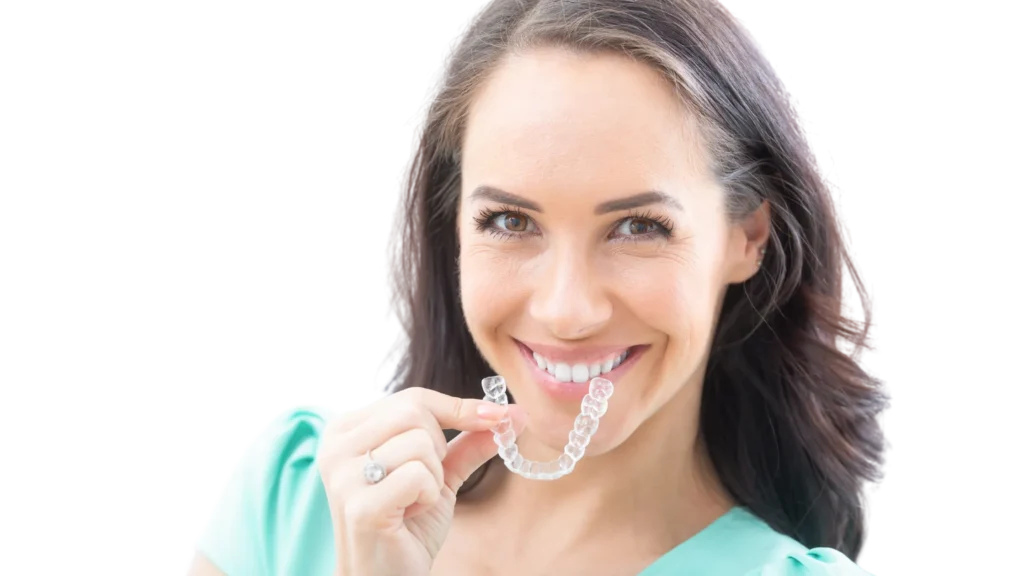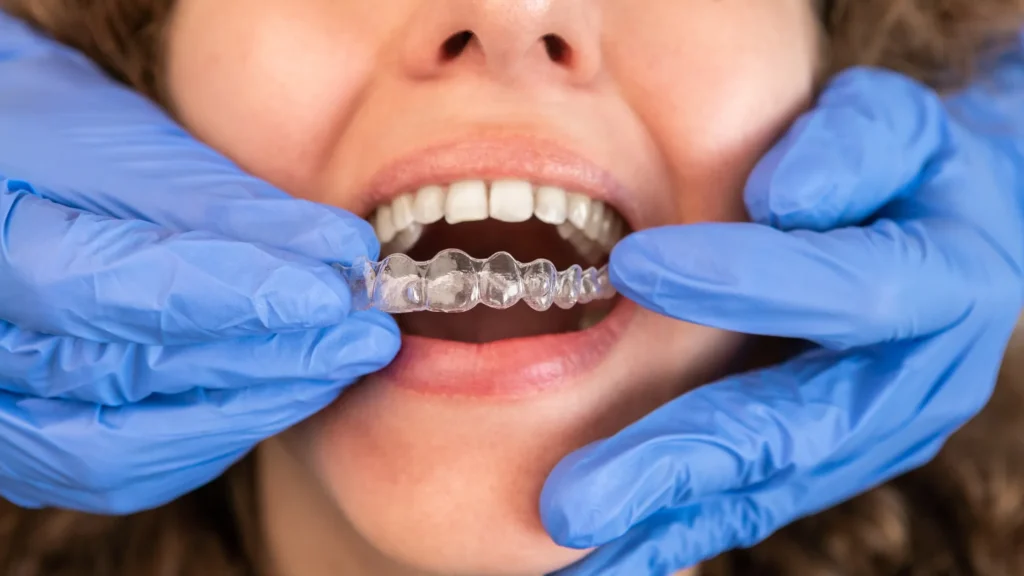Silicone mouthguards are versatile dental appliances that can provide a range of benefits for individuals with various dental and sleep-related issues. But there are some Silicone Mouth Guard Side Effects you must know.
Silicone mouth guards are common oral accessories used to prevent teeth from grinding, clenching, and tooth injuries when participating in sports. While they provide several advantages, it is critical to be aware of any potential adverse effects linked with their use. In this post, we will look at the most prevalent adverse effects of silicone mouthguards and how to reduce them for a more comfortable and successful experience.
What is a silicone mouthguard?

A silicone mouth guard is a dental item that protects the teeth, gums, and jaw during a variety of activities. It is often constructed of silicone, a flexible and durable substance recognized for its hypoallergenic characteristics and ability to tolerate wear and tear. Silicone mouth guards are available in standard or bespoke sizes and can be simply fitted over the teeth for maximum comfort and protection.
A silicone mouth guard’s principal function is to act as a barrier between the upper and lower teeth, softening the impact of pressures applied to the mouth. This can involve clenching and grinding of the teeth, sports-related trauma, or even certain medical problems. A silicone mouth guard, by absorbing and spreading forces, helps avoid dental injuries such as chipped, cracked, or knocked-out teeth, as well as injury to the gums, tongue, and jaw.
Silicone mouth guards come in a variety of thicknesses, allowing for customization depending on personal needs and preferences. Thicker mouth guards offer better protection for high-impact activities, while thinner ones may be appropriate for less rigorous activities. Some silicone mouthguards have additional features such as perforations for improved airflow or alignment notches to promote jaw posture and comfort.
Why do people use silicone mouth guards?

Because of their efficiency in protecting teeth and maintaining oral health, silicone mouth guards are extensively utilized for a variety of purposes. The following are the principal applications for silicone mouth guards:
Teeth Grinding and Clenching: One of the main reasons individuals use silicone mouth guards is to ease the harmful consequences of bruxism, or teeth grinding and clenching. These habits can result in tooth enamel wear, discomfort, and even tooth fractures. Silicone mouth guards serve as a cushioning barrier between the upper and lower teeth, softening the pressure of grinding forces and preventing tooth damage.
Sports and Athletic Activities: Silicone mouth guards are very popular among athletes who participate in contact sports or activities that put their teeth at risk. They form a protective coating that absorbs and distributes impact force, lowering the likelihood of chipped, fractured, or knocked-out teeth. Silicone mouth guards provide crucial protection for players participating in hockey, boxing, martial arts, or any other high-impact sport.
TMJ Management: People with temporomandibular joint disorder, often known as TMJ disorder, frequently experience jaw pain, headaches, and trouble opening or closing their jaws. Due to their steady bite and less stress on the jaw joint, silicone mouth guards can aid with these symptoms. They provide support and aid in releasing pressure from the TMJ, which encourages comfort and better jaw function.
Sleep Apnea and Snoring: Some silicone mouth guards are made expressly to manage moderate obstructive sleep apnea and snoring. By shifting the jaw and tongue during sleep, these devices help maintain an open airway. Silicone mouth guards can improve airflow and lessen snoring, which can improve sleep quality and possibly lessen the signs of sleep apnea.
Protection during Physical Activities: Silicone mouth guards can be worn during physical activities other than sports where there is a chance of an unintentional mouth impact. This includes leisure pursuits including bicycling, skating, and rollerblading. A silicone mouth guard adds an additional layer of defence, lowering the possibility of oral injury from falls or collisions.
Benefits of using a silicone mouth guard.
Bruxism, or teeth grinding, can result in enamel loss, dental discomfort, and even tooth fractures. Protects teeth from grinding and clenching. Silicone mouth guards reduce the impact of grinding forces and guard against dental injury by forming a soft barrier between the upper and lower teeth.
reduces the risk of oral injuries sustained while participating in sports: High-risk sports include martial arts, boxing, and hockey. A silicone mouth guard offers a layer of protection, insulating the teeth from direct impact and reducing the possibility of cracked or broken teeth.
reduces temporomandibular joint (TMJ) symptoms: TMJ problems can lead to headaches, jaw pain, and trouble opening or closing the mouth. To aid with TMJ problems, silicone mouth guards stabilize the bite and lessen the stress on the jaw joint.
Silicone Mouth Guard Side Effects

There are many Silicone Mouth Guard Side Effects you need to know, they are:-
Some people may have jaw pain or discomfort, particularly during the initial period of adaptation. This is frequently caused by the jaw muscles adjusting to the mouth guard’s presence. However, once the muscles adjust, this soreness typically goes away.
Drooling and increased salivation are possible side effects of using a silicone mouth guard. A foreign object in the mouth might increase salivation, resulting in momentary excess saliva and sporadic drooling. The mouth usually adapts over time, and these negative effects lessen.
Discomfort in speaking: Speaking clearly may be challenging at first while wearing a silicone mouth guard. Normal speaking patterns may momentarily be affected by the appliance’s size and tongue placement. However, most people are able to regain their normal speech ability with time and steady adaption.
Feeling uncomfortable when sleeping: For some people, getting used to sleeping with a silicone mouth guard is difficult. It may take some getting used to the feeling of wearing an oral appliance while you sleep. However, most people eventually acclimatize, and any early discomfort goes away.
Allergic reactions: Although uncommon, some people may encounter allergic reactions to the components of silicone mouth guards. Skin irritations, rashes, or swelling of the lips, tongue, or throat are some of the symptoms of allergies. If you have any allergy symptoms, stop using the product right once and seek medical advice to reduce the risk of Silicone Mouth Guard Side Effects.
How to minimize silicone mouth guard side effects?
Although Silicone Mouth Guard helps in many ways till many Silicone Mouth Guard Side Effects you need to know, it is also important to know How to minimize silicone mouth guard side effects, list are given below:-
Make sure your silicone mouth guard fits comfortably by selecting the appropriate size and shape. Mouth guards that don’t fit properly might cause discomfort and jaw pain. To have a mouth guard that is specially made to match the specific dimensions of your mouth, speak with a dentist or other dental expert, to minimize silicone mouth guard side effects.
Allow yourself time to gradually become used to wearing a silicone mouth guard. You might initially feel a little uncomfortable or have some speaking difficulties. Start by wearing it during the day for shorter times, then gradually extend the time until you feel at peace wearing it for longer periods, such as while you sleep, it may help you to minimise the problem of wearing Silicone Mouth Guard side effects
Cleaning your silicone mouth guard frequently will help you maintain good oral hygiene. After each usage, rinse it with warm water before cleaning it with a toothbrush and gentle soap. Refrain from using harsh chemicals or hot water that could harm the fabric. The life of the mouth guard is increased and bacterial development is reduced with proper cleaning.
Getting professional advice: Speak with a dental expert if you develop chronic problems or Silicone Mouth Guard side effects or discomfort. They can evaluate how well your mouth guard fits, make any required modifications, and offer advice on how to handle adverse effects.
Alternatives to Silicone Mouth Guards
Some alternatives of silicon mouth guards, the list are given below if some one are searching for any better options or to avoid the risk of wearing silicone mouth guard side effects
Thermoplastic mouth guards: Thermoplastic mouth guardsare constructed from a heat-sensitive polymer that stretches when heated. By submerging them in hot water and then biting into them, they may be shaped and individually fitted to the teeth. The substance hardens and keeps the shape of the teeth as it cools. Similar to silicone mouth guards, thermoplastic mouth guards provide an adequate fit and protection.
Mouthguards made of Polyethylene Vinyl Acetate (EVA): EVA mouthguards are constructed of a high-density material that offers good shock absorption and durability. They provide good protection from dental injuries when participating in sports. For a better fit and maximum comfort, EVA mouth guards can be custom produced by dental specialists or bought in standard sizes.
Custom-Made Mouth Guards: Other materials, such as acrylic, can also be used to make custom-made mouth guards in addition to silicone. Based on impressions of the wearer’s teeth, dental specialists create these mouth guards specifically for each person. The best fit, comfort, and protection are offered by mouth guards that are made to order since they are created especially to fit each person’s mouth.
Boil-and-Bite Mouth Guards: Stores sell boil-and-bite mouth guards, which are constructed of a thermoplastic polymer comparable to silicone. By heating them in water to soften the material and then biting into them to form an impression, they can be customised to fit the individual’s teeth. As the mouth guard cools, it forms to the contour of the wearer’s teeth. Boil-and-bite mouth guards, while not as exact as custom-made mouth guards, provide a more personalised fit than ordinary, pre-formed mouth guards.
Stock Mouth Guards: These are pre-formed mouth guards that come in common sizes. They can be purchased from sporting goods stores or pharmacies. Because they are not customised to the individual’s mouth, stock mouth guards are the most cheap alternative but may not provide the best fit or comfort. They are less protective in general and may obstruct speech or breathing to some extent.
Price Range of Silicone Mouth Guards
Custom-Made Silicone Mouth Guards: These mouth guards, which are commonly purchased from dentists, tend to be on the more expensive end of the price spectrum. The complexity of the modification, the dentist’s experience, and the area in which you live all have an impact on the price. Custom-made silicone mouthguards often cost between $200 and $500 or more.
Over-the-Counter Silicone Mouth Guards: Compared to custom-made solutions, over-the-counter silicone mouth guards are typically more economical and can be found at pharmacies, sporting goods stores, or online merchants. The brand, design, and supplemental features can all affect the price. Silicone mouth guards purchased over the counter often cost $20 to $100.
If want to Know more about SIDE EFFECTS CLICK HERE
Referrances: Google, Amazon, Proteeth Guards
Conclusion
Silicone mouth guards are useful devices for guarding teeth, avoiding dental accidents, and treating TMJ conditions. Although they have many advantages, it’s crucial to be aware of any possible negative consequences. One of the most frequent negative effects of silicone mouth guards is jaw pain. Other side effects include salivation, speech difficulties, and discomfort while sleeping. These negative effects, however, are typically brief and can be avoided by selecting the best fit, allowing for an adjustment period, practicing proper dental hygiene, and seeing a professional when necessary. Silicone mouth guards can offer great defense and support for your dental health with the right maintenance and modification.
FAQs (Frequently Asked Questions)
Are silicone mouth guards suitable for everyone?
Silicone mouth guards are generally suitable for most individuals. However, those with certain allergies or specific dental conditions should consult with a dental professional before using one.
Can I wear a silicone mouth guard during sports activities?
Yes, silicone mouth guards are excellent for sports activities as they provide effective protection against dental injuries caused by impact or contact.
How often should I clean my silicone mouth guard?
It is always recommended to clean your silicone mouth guard after each use. Regular cleaning helps maintain its hygiene and prolong its lifespan.
What should I do if my silicone mouth guard feels uncomfortable?
If your silicone mouth guard feels uncomfortable, consult with a dental professional. They can assess the fit and make any necessary adjustments for a better fit and increased comfort.
Can I wear a silicone mouth guard if I have braces?
Yes, silicone mouth guards can be worn with braces. But it is recommended to consult with an orthodontist for proper fit and adequate protection for your teeth and braces.